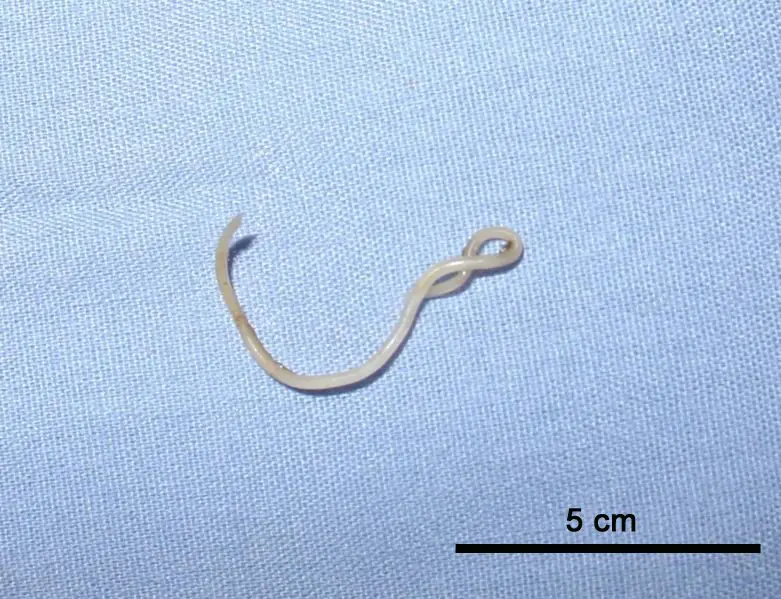If you have a dog, then you know that they can get worms. And if your dog has worms, you probably want to get rid of them as soon as possible!
There are a few different ways to do this, but the most common is by giving your dog worm pills. But can a dog still have worms after giving it 2 doses of pills?
In this blog post, we will talk about how to worm a dog and whether or not two doses of pills are enough.
Key Takeaway
- A dog can still have worms after administering two doses of deworming pills, as these medications primarily eliminate adult worms and may not kill larvae or eggs, necessitating additional treatments.
- It is possible to switch worm medications if the first one didn’t work, as different medications target different worm species and some worms may develop resistance to certain medications, making it necessary to change the treatment.
- The most effective dewormers for dogs as of 2023 include PetArmor 7 Way Dog Dewormer, SENTRY PET CARE Dog Dewormer, Panacur C Dog Dewormer, Trifexis Chewable Tablets for Dogs, and Drontal Plus, as these products have been highly-rated and vet-approved for their effectiveness against various types of worms.
Can a Dog Still Have Worms After Giving It 2 Doses Of Pills?

A dog can indeed retain worms even after receiving two doses of deworming pills, as these medications primarily target adult worms and may not eliminate larvae.
From my experience as a veterinarian, it’s not uncommon for dogs, especially puppies, to need repeat deworming treatments. Deworming pills are effective at killing adult worms, but they don’t always eradicate the larvae.
This means that even after two rounds of treatment, some worms may survive and continue to grow, leading to a persistent infestation.
Another factor to consider is the type of worm your dog is infected with. Certain types, like tapeworms, are more resistant to treatment and may require specialized medication or multiple doses to fully eliminate.
It’s also critical to administer the correct dosage based on your dog’s weight to ensure the medication’s effectiveness.
Moreover, it’s crucial to understand that deworming doesn’t prevent reinfestation. If your dog is exposed to the same environment or conditions that led to the initial infestation, they could become reinfected even after successful treatment.
In my practice, I often advise owners to maintain regular deworming schedules as recommended by their vet, keep their pets’ living areas clean, and take steps to control fleas, which can carry certain types of worms.
Can I Switch Worm Medications If The First One Didn’t Work?
Switching worm medications can be a viable option if the first one doesn’t work, but it should always be done under the guidance of a veterinarian to ensure it’s safe and effective for your dog.
In my years as a veterinarian, I’ve encountered situations where a particular deworming medication didn’t seem to eliminate a dog’s worm infestation. In these cases, switching to a different medication can indeed be an appropriate course of action. However, it’s essential to consult with a vet before making this decision.
Different deworming medications target different species of worms. If the first medication didn’t work, it might be because it wasn’t the right one for the type of worms your dog has. Also, some worms may develop resistance to certain medications over time, necessitating a switch to a different product.
Additionally, the dosage and frequency of administration can impact the effectiveness of the treatment. Sometimes, a medication may appear not to work because it was not administered correctly or not given for a sufficient duration.
Before switching medications, a vet will likely want to confirm the presence and type of worms through a fecal examination. This helps ensure that the new medication chosen will be effective against the specific worms affecting your dog.
It’s also worth noting that deworming treatments do not prevent re-infestation. If your dog is continually exposed to worm larvae in their environment, they may become re-infested after treatment. In such cases, ongoing preventative measures, such as regular fecal examinations and deworming treatments, may be recommended says NHS.
Most Effective Dewormers for Dogs
The most effective dewormers for dogs as of 2023 include popular and vet-approved products such as PetArmor 7 Way Dog Dewormer, SENTRY PET CARE Dog Dewormer, Panacur C Dog Dewormer, Trifexis Chewable Tablets for Dogs, and Drontal Plus.
PetArmor 7-Way Dog Dewormer
PetArmor 7 Way Dog Dewormer is a top-rated product due to its broad-spectrum effectiveness. It’s capable of treating seven different types of worm infestations, including tapeworms, roundworms, and hookworms, making it a versatile choice for dog owners. As a veterinarian, I’ve recommended this product to many clients and have seen good results.
SENTRY PET CARE Dog Dewormer
SENTRY PET CARE Dog Dewormer is known for its effectiveness in combating worm infestations in dogs. The medication is easy to administer and has a proven track record in eliminating a variety of worms. In my practice, I’ve observed that dogs tolerate this dewormer well and it often yields successful outcomes.
Panacur C Dog Dewormer
Panacur C Dog Dewormer is a widely recommended product that is particularly effective against Giardia. It contains the active ingredient fenbendazole, which is known for its broad-spectrum deworming properties. Over the years, I’ve seen this product work well in dogs with various worm infestations.
Trifexis Chewable Tablets for Dogs
Trifexis Chewable Tablets for Dogs are a one-and-done monthly tablet that not only treats worm infestations but also prevents the majority of parasites your dog can contract. I’ve found this product to be a convenient option for dog owners, combining parasite prevention and deworming in one easy step.
Drontal Plus
Drontal Plus is a potent dewormer that contains Praziquantel, Pyrantel Pamoate, and Febantel. It’s effective against whipworms, hookworms, and tapeworms, providing broad-spectrum treatment. As a vet, I’ve found this to be a reliable choice for dogs with multiple types of worm infestations says Vet Help Direct.
Can I Give My Dog a Dewormer Twice In One Week?

Administering dewormer to your dog twice in one week can be done if prescribed by a vet, but it’s generally not recommended unless necessary due to potential side effects and the risk of overdosing.
As a veterinarian, I’ve often been asked about the frequency of deworming treatments. While it is technically possible to give a dog dewormer twice in one week, this is not usually recommended.
The reason for this is that deworming medications are potent and can have side effects such as vomiting, diarrhea, or loss of appetite. Over-deworming can make these side effects more likely or more severe.
The effectiveness of deworming also depends on the life cycle of the specific type of worm. Some worms have a two-week life cycle, meaning a second dose of dewormer may be necessary after two weeks to ensure any larvae that have matured into adults are also killed. Giving a second dose too soon may not be effective.
In my practice, I always consider the type of worm, the severity of the infestation, and the dog’s overall health before deciding on a deworming schedule. If I do recommend administering dewormer twice in one week, I monitor the dog closely for adverse reactions.
How Many Doses Does It Take To Get Rid Of Worms In Dogs?

The number of doses it takes to get rid of worms in dogs typically ranges from one to three, but it ultimately depends on the type of worm and severity of the infestation.
Throughout my career as a veterinarian, I’ve found that deworming is not always a one-and-done treatment. The number of doses required to eliminate worms in dogs can vary greatly based on several factors.
Firstly, the type of worm plays a significant role. For instance, roundworms and hookworms are generally easier to treat and might require only one or two doses of a broad-spectrum dewormer. On the other hand, tapeworms and whipworms can be more stubborn and may necessitate multiple treatments with a specific type of dewormer.
Secondly, the severity of the infestation influences the treatment plan. A mild infestation might be cleared with a single dose, while a severe one could require repeated treatments.
Lastly, the dog’s overall health and age are also considered. Puppies, for example, often require several rounds of deworming due to their higher susceptibility to parasites.
In my practice, I often follow up the initial treatment with a second dose two weeks later to ensure any remaining larvae, which may have been unaffected by the first treatment, are eliminated once they mature into adults. This is followed by regular fecal examinations to confirm the infestation has been successfully treated.
Can Dogs Overdose On Worm Medication?

Dogs can indeed overdose on worm medication, which can lead to serious health complications and must be avoided through proper dosage and administration.
In my years of working as a veterinarian, I’ve seen cases where dogs have overdosed on worm medication. This typically happens when the owner inadvertently administers too much of the drug, uses it more frequently than recommended, or uses a product not suitable for their dog’s size, age, or health status.
Overdosing on deworming medication can lead to a range of symptoms in dogs, from mild side effects like nausea, vomiting, and diarrhea, to more severe conditions such as tremors, seizures, and even life-threatening situations.
It’s important to remember that while deworming medications are generally safe when used correctly, they are still potent drugs that should be administered with care.
In my practice, I always stress the importance of following the dosing instructions provided by the manufacturer or the vet. Typically, these doses are based on the dog’s weight, so it’s essential to have an accurate weight for your dog.
Also, it’s important to use the correct medication for the type of worm your dog has, as not all dewormers are effective against all types of worms.
If you suspect your dog has overdosed on worm medication, seek immediate veterinary attention. The vet may induce vomiting, administer activated charcoal to absorb the drug, or provide other treatments based on the dog’s condition.
Signs of Dewormer Overdose In Dogs
Signs of dewormer overdose in dogs can vary but often include symptoms such as vomiting, loss of appetite, diarrhea, disorientation, and even seizures or coma in severe cases.
Depression and Lethargy
One of the first signs of a dewormer overdose in dogs is a noticeable change in their behavior. Dogs may become unusually quiet, show less interest in activities they usually enjoy or seem overly tired. As a vet, I’ve seen how this lethargy can be a clear indication that a dog isn’t feeling well and may have ingested too much medication.
Disorientation and Loss of Balance
Another common sign of dewormer overdose is disorientation. Dogs may appear confused, have difficulty walking straight, or lose their balance. This is due to the effect of the overdose on their central nervous system.
Excessive Drooling and Vomiting
Excessive drooling and vomiting are also typical signs of an overdose. These symptoms occur because the dog’s body is trying to get rid of the excess medication. In my practice, I’ve seen dogs present with these symptoms after accidentally being given too much dewormer.
Seizures or Tremors
In severe cases of dewormer overdose, dogs may experience seizures or tremors. This is a serious symptom that requires immediate veterinary attention. It’s one of the most distressing symptoms to witness as a vet and pet owner, but prompt treatment can make a significant difference in the outcome.
Other Symptoms
Other potential signs of a dewormer overdose include dilated pupils, loss of appetite, trouble standing, and in extreme cases, coma. If your dog shows any of these symptoms after receiving a deworming treatment, it’s crucial to contact a vet immediately.
How Long Does It Take For a Dog To Get Rid Of Worms After Medication?

After administering deworming medication, it generally takes between 2 to 6 hours for the treatment to start working, and dogs may continue to pass worms or worm fragments in their stool for up to a week.
As a practicing veterinarian, I’ve often been asked about how quickly deworming treatments work in dogs. From my experience, the active ingredients in these medications start to take effect rather swiftly, usually within a few hours. This is when the medication begins to kill the worms present in the dog’s system.
The dead worms or parts of them are then expelled from the dog’s body through their feces. Dog owners can typically expect to see worms in their pet’s stool starting around 2-6 hours after administering the medication. It’s important to note that this is a good sign, indicating that the deworming treatment is effectively killing the parasites.
Depending on the severity of the infestation, dogs may continue to pass worms in their stool for several days, even up to a week post-treatment. This is because the deworming medication not only kills adult worms but also targets eggs and larvae, which may mature and die at different stages post-treatment.
However, it’s crucial to remember that each dog is unique, and their response to deworming treatment can vary. In some cases, side effects such as lethargy or diarrhea may also be observed for 24-48 hours post-treatment.
FAQs
Q: How long does it take for worm medication to work in dogs?
A: The time it takes for worm medication to work in dogs can vary depending on the type of medication and the severity of the infestation. In some cases, it may take a few days for the medication to start killing the worms, while in others it may take up to a week or more. It’s important to carefully follow the instructions provided by your veterinarian and continue giving the medication for the recommended duration to ensure that all the worms are eliminated.
Q: How often should I give my dog worm medication?
A: The frequency of worm medication for dogs can vary depending on the specific medication and your dog’s risk of exposure to worms. In general, it’s recommended to give preventive worm medication to dogs on a monthly basis. However, if your dog is at a higher risk of exposure or has a current infestation, your veterinarian may recommend more frequent dosing. It’s best to consult with your veterinarian to determine the most appropriate dosing schedule for your dog.
Q: Can I give my dog over-the-counter worm medication?
A: It’s not recommended to give your dog over-the-counter worm medication without consulting with a veterinarian first. Over-the-counter medications may not be as effective as prescription medications and could potentially cause harm to your dog if not used correctly. Additionally, not all worm medications are suitable for all types of worms, so it’s important to get a proper diagnosis from a veterinarian before starting any treatment.
Q: How do dogs get worms?
A: Dogs can get worms through various means. The most common way is through ingestion of worm eggs or larvae that are present in contaminated soil, feces, or food. Dogs can also get worms from ingesting infected animals, such as rodents or fleas, or through close contact with other infected dogs. It’s important to practice good hygiene and preventive measures to minimize the risk of worm infestations in dogs.
Q: What are the common signs of a worm infestation in dogs?
A: The common signs of a worm infestation in dogs can vary depending on the type of worm. However, some general signs to look out for include diarrhea, vomiting, weight loss, a pot-bellied appearance, poor coat condition, weakness, and an overall decline in health. It’s important to note that some dogs may not show any obvious signs of a worm infestation, which is why regular preventive deworming is recommended.
Q: Can humans get worms from dogs?
A: Yes, certain types of worms that infect dogs can also be transmitted to humans. These are known as zoonotic parasites. The most common zoonotic worms include roundworms, hookworms, and tapeworms. It’s important to practice good hygiene, such as regular handwashing and cleaning up after your dog’s feces, to minimize the risk of transmitting worms from dogs to humans.
Q: Can I prevent my dog from getting worms?
A: While it may not be possible to completely prevent your dog from getting worms, there are several preventive measures you can take. These include regular deworming as recommended by your veterinarian, maintaining good hygiene, such as picking up your dog’s feces promptly, preventing your dog from ingesting infected animals or their feces, and keeping your dog’s living environment clean and free from possible sources of infestation.
Q: Can I deworm my dog at home?
A: It’s generally recommended to deworm your dog under the guidance of a veterinarian. While there are over-the-counter deworming products available, they may not be as effective or suitable for all types of worms. Additionally, a veterinarian can provide a proper diagnosis, determine the appropriate type of medication, and advise on the correct dosage and administration. This ensures that your dog receives the most effective and safe treatment for their specific needs.
Conclusion and final thoughts
In conclusion, it is possible for a dog to still have worms even after receiving two doses of pills.
While medication can be effective in treating worm infestations, it may not eliminate all the worms in one go.
This could be due to various factors such as the type of worm, the severity of the infestation, or the effectiveness of the medication used.




